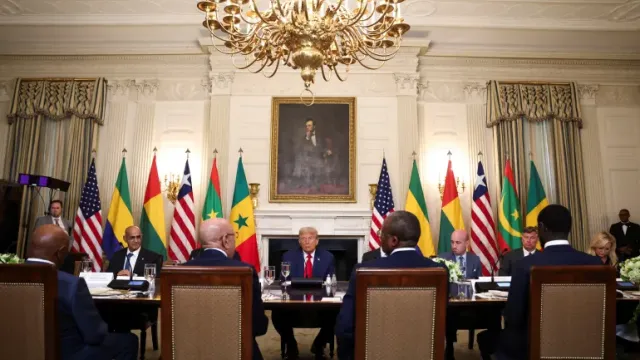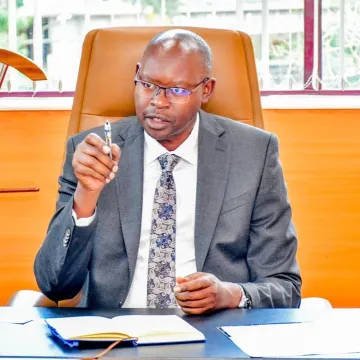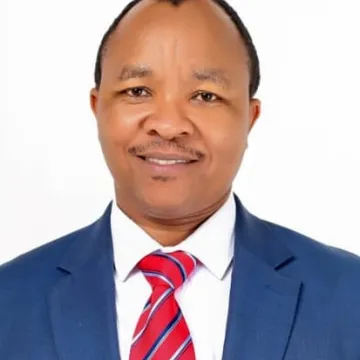Trump touts U.S. as better trade partner with Africa than China

US President Donald Trump hosts a lunch for African leaders of Gabon, Guinea-Bissau, Liberia, Mauritania, and Senegal in the State Dining Room at the White House in Washington, DC, US, July 9, 2025 [Kevin Lamarque/Reuters]
U.S. President Donald Trump has declared a new approach to Africa, stating that the United States is moving “from aid to trade” and positioning itself as a superior partner to China on the continent.
Trump made the remarks during a high-profile meeting at the White House on Wednesday, where he hosted presidents from five African nations — Gabon, Guinea-Bissau, Liberia, Mauritania, and Senegal — for a business-focused discussion on economic opportunities and investment.
“We’re shifting from aid to trade,” Trump told the assembled leaders. “There’s great economic potential in Africa, like few other places. In many ways, in the long run, this will be far more effective and sustainable and beneficial than anything else that we can be doing together,” he added.
The leaders welcomed Trump’s engagement, with some even calling for the him to be awarded a Nobel Peace Prize for his role in brokering global peace deals. Liberian President Joseph Boakai endorsed Trump’s signature slogan, saying he supported efforts to “make America great again,” and called for increased U.S. investment in Liberia.
Trump praised Boakai’s command of English and asked where he had learned it — seemingly unaware that English is Liberia’s official language, owing to its founding by freed American slaves. Boakai clarified that he had learned the language in Liberia.
Gabonese President Brice Clotaire Oligui Nguema echoed the call for partnership, emphasizing the continent’s untapped wealth: “We are not poor countries. We are rich countries when it comes to raw materials. But we need partners to support us and help us develop those resources,” he said. “You are welcome to come and invest. Otherwise, other countries might come instead of you.”
Trump used the platform to reiterate his administration’s belief that the U.S. treats African nations better than China. “We treat Africa far better than China or anybody else, anyplace else,” he said.
According to Reuters, the mini-summit is part of a broader push by successive U.S. administrations to counter China’s deepening economic influence across Africa, particularly in strategic sectors such as mining, infrastructure, and digital technology.
Despite the positive rhetoric, Trump’s record in Africa is viewed by many as mixed at best. He never visited the continent during his presidency, and his 2018 remarks referring to some African nations as “shithole countries” drew sharp criticism and accusations of racism.
In May of this year, Trump also clashed with South African President Cyril Ramaphosa over debunked claims of land seizures and white genocide.
Still, Wednesday’s event lacked such tensions. Instead, it was marked by mutual flattery, with Trump quipping, “I could do this all day long,” after repeated compliments from the African leaders.
The meeting comes as Africa experts anticipate a larger summit involving more African heads of state later this year, possibly timed around the United Nations General Assembly in September.
Trump’s trade-first doctrine has been coupled with deep cuts to foreign aid and the dismantling of the U.S. Agency for International Development (USAID). His administration’s "America First" agenda has seen letters sent to various countries notifying them of tariff hikes, and has drawn criticism for targeting African nations with restrictive visa policies.
Critics warn that such austerity could have deadly consequences. A recent study published in The Lancet medical journal estimates that U.S. aid cuts could result in over 14 million additional deaths by 2030 across low-income countries.
All five countries at the meeting are home to significant reserves of critical minerals such as lithium, cobalt, manganese, and gold — elements vital to modern technology. Whether Trump’s model of business-first diplomacy resonates more deeply than aid-driven policies remains to be seen





